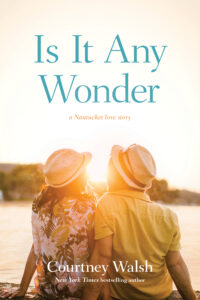By Courtney Walsh, @courtney_walsh

Some of my worst memories from childhood are easily from the few times I got in trouble: The time I started a fire near the shed in our backyard and blamed it on literally every other kid in the neighborhood. The time my brother and I had a water fight in the bathroom when we were supposed to be getting ready for bed. (There was water dripping from the ceiling—we were very good at water fighting.) And let’s not forget the time I thought the A-1 steak sauce would come out slowly, like ketchup, and splattered it all over my plate, then muttered a giant F-bomb, which nobody in my family ever used. (Got my mouth washed out with soap for that one. I swear I haven’t said that word since.)
I don’t like to get into trouble.
I was never called to the principal’s office. I never had a detention in high school. I was the regular designated driver.
In short, I followed the rules.
I like rules. They’re easy to understand, and they make sense to me. Chaos, on the other hand, does not. Which is why, when I started writing novels, I searched everywhere I could for a neat set of rules I could follow to get my story down. I was convinced that if someone just explained to me their process, I could duplicate it and voila! I’d be a novelist too.
But I quickly realized that it doesn’t quite work that way with writing. Let me preface this by saying there are, of course, “rules” of writing that every author needs to know. You need to understand character development, plot, how to write dialogue, how to structure the story, etc.
But that’s not what I was looking for. I was looking for a magic formula to follow. All the rules a story needed to be “good.” And really, none of the imagination.

I spent a very long time trying to force my creative self into a box because someone somewhere had convinced me that this was the way to write a novel. But I quickly learned that my creativity is different. And so is yours. It’s not so linear. It’s not even always the same from one book to the next. So, while I highly recommend reading up on what other authors do to craft a story, I also want to give every writer permission to deviate from someone else’s plan.
Their rule book will not be your rule book.
Because the way a story is written—the actual process of sitting down and writing—is a wholly individual and unique experience. As an author, you get to write your own set of rules. And here’s the thing—there’s no “right” way to do it.
If you want to get an idea and spend hours pecking away on your computer until it starts to turn into a story, and that excites you, that is every bit as fine as another author carefully outlining each detail, each chapter, each plot point. And the only time it doesn’t feel like it’s okay to have a process that’s different from someone else’s is when you’re comparing yourself to someone else, and let’s be real—that’s a surefire way to get yourself into mental trouble.
Even for a rule follower like me, this kind of creative approach is freeing. There’s no “right” way to write. There’s only the process that works for you.
If you’re struggling with outlining, try pantsing. If you’re struggling not having a road map, take time to plot out your story by chapter. Give yourself permission to deviate from your original plan, to write new rules for yourself and more than anything, to buckle up and enjoy the ride.
Your story will be better for it.

Twelve years ago, Cody Boggs and Louisa Chambers made a pact that no matter where their lives took them, they’d return to Nantucket Island’s Brant Point Lighthouse on July 30, their shared golden birthday, and continue their tradition of exchanging birthday wishes. But that was before a tragic accident upended both of their lives, irrevocably pulling them apart.
Their worlds collide just months before that particular day when Louisa’s fledgling event planning company is hired by the local Coast Guard station, where she discovers Cody has recently returned to the island as the second in command. As they plan a regatta fundraiser, hoping to promote positive PR in the community, neither can deny the fireworks each encounter ignites. But working together also brings up memories of the day Cody’s father died, revealing secrets that have Cody and Louisa questioning everything they thought they knew and felt about their families and each other.

Courtney Walsh is a New York Times and USA Today best-selling author. She writes small town romance and romantic women’s fiction while juggling the performing arts studio and youth theatre she owns and runs with her husband. Courtney is a Carol award winner and Christy Award finalist who has written thirteen novels, two craft books and several full-length musicals. She lives in Illinois with her husband and three children and a sometimes naughty Bernedoodle named Luna.